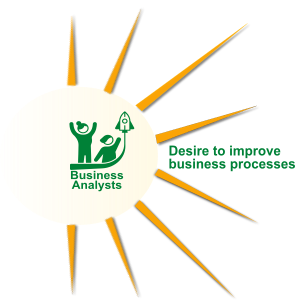Business Analyst Motivation
What Drives a Great Business Analyst
A successful career makes the most of one’s talent, value, and motivation. What motivates a business analyst with exceptional talent? The desire to improve a business’s processes and value to its customers.
Before a business analyst starts on a solution for a business, he or she knows its value:
What customers pay for
Why customers buy from the business instead of its competitors
The business analyst works with stakeholders to discover what the business needs from a solution. He or she learns the role each stakeholder plays in delivering business value.
Discovering Optimal Value
The business analyst expresses curiosity about:
The impact a solution will have on the business delivering value to customers
How a solution will improve the value or lives of business stakeholders
The business analyst keeps stakeholders focused on a solution’s business value, motivating them to determine optimal solution value.
Motivated Business Analyst Case Study
A solar energy business wants to improve customer communications. Some customers prefer to get information they need online, rather than waiting to talk to a representative.
When the business hired the business analyst, she learned they want customers to have great experiences with sales, installation and customer service. The business stays ahead of its competitors through customer referrals. She realizes how much the business values customer relationships.
The business analyst leads discovery with a customer service team and information technology director, focusing on optimal customer relations. The customer service vice president wants to relieve the call center from answering frequently asked questions by offering answers and documents online.
The business analyst asks what other types of calls customer service gets frequently. A manager says most calls ask for account information. The customer service VP wants customers to get account information from representatives to avoid misunderstandings.
The business analyst proposes they offer account information online, along with a live chat or call back option to answer further customer questions about their account. The IT director points out showing account information would require an expensive integration with their operations system. The business analyst asks if improved customer experience would be worth the integration cost. The customer service VP needs to think about it.
The business analyst learned that the business tracks carbon emission savings for each customer. She mentions they could show customers their savings with their account information online. It could include options to share the carbon emission savings on social media. The customer service VP collaborates with marketing and convinces the CEO to offer account information online. Customers sharing their carbon emissions savings makes it worth the integration cost.
Better Than Expected
The business analyst started with a healthy curiosity of the solar energy company’s values and needs. She maintained her curiosity throughout discovery, learning that most customer calls request account information, which includes carbon emission savings.
She paid attention to all stakeholders, acknowledging the customer VP’s desire to avoid misunderstandings. She paid attention to the IT director’s cost concerns, balancing them against the account information benefits.
The business analyst respects what every stakeholder says, even if she does not agree with it.
Her curiosity and attention to business value earned her the respect of the other stakeholders. She recognized the value of providing account information for customers any time online, even with an integration cost. She helped the customer service VP decide to propose showing account information to customers.
She appreciated the call data provided by the service team, showing the benefit of providing account information online. The customer service VP appreciated the value of showing account information online, backed up with easy access to a representative. Customers appreciate getting their carbon emission savings and sharing them with their friends. The CEO appreciates the subsequent rise in customer referrals. The business analyst realizes that appreciation motivates people by connecting them to the value they bring to a process.
As the business analyst continued to develop a valuable solution with the stakeholders, she earned their trust as she developed her trust in them. She recalls a quote from Stephen Covey:
When the trust account is high, communication is easy, instant, and effective.
She keeps these motivators in mind with the acronym CARAT:
Curiosity about the business and stakeholders
Attention to what they need to deliver value
Respect for stakeholders at every level
Appreciate the value everyone adds to a solution
Trust developed by earning respect and appreciation from stakeholders
Improving businesses with valuable solutions motivates a business analyst.
See our article Motivating Specific Requirements for the key questions motivated business analysts ask business stakeholders.

